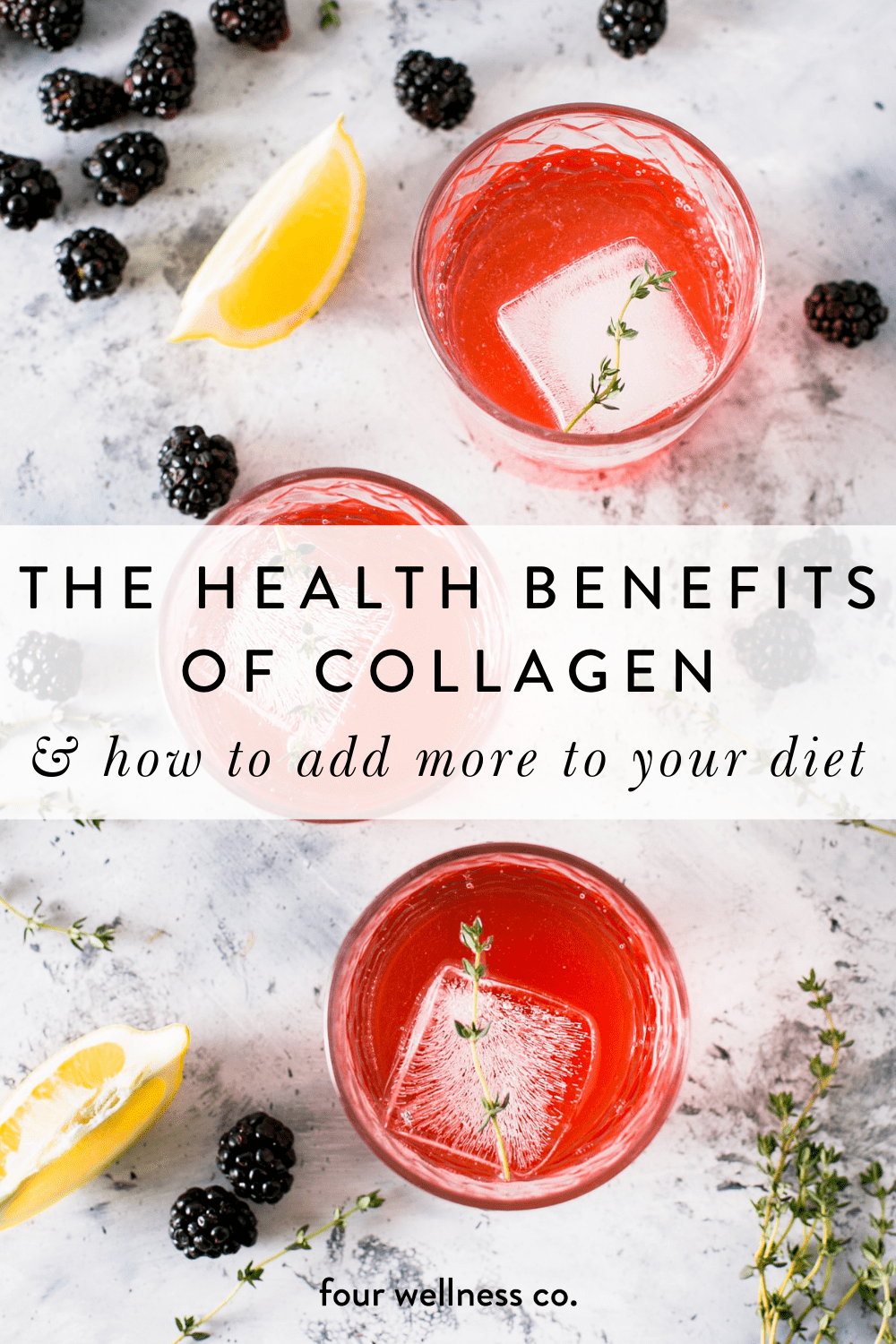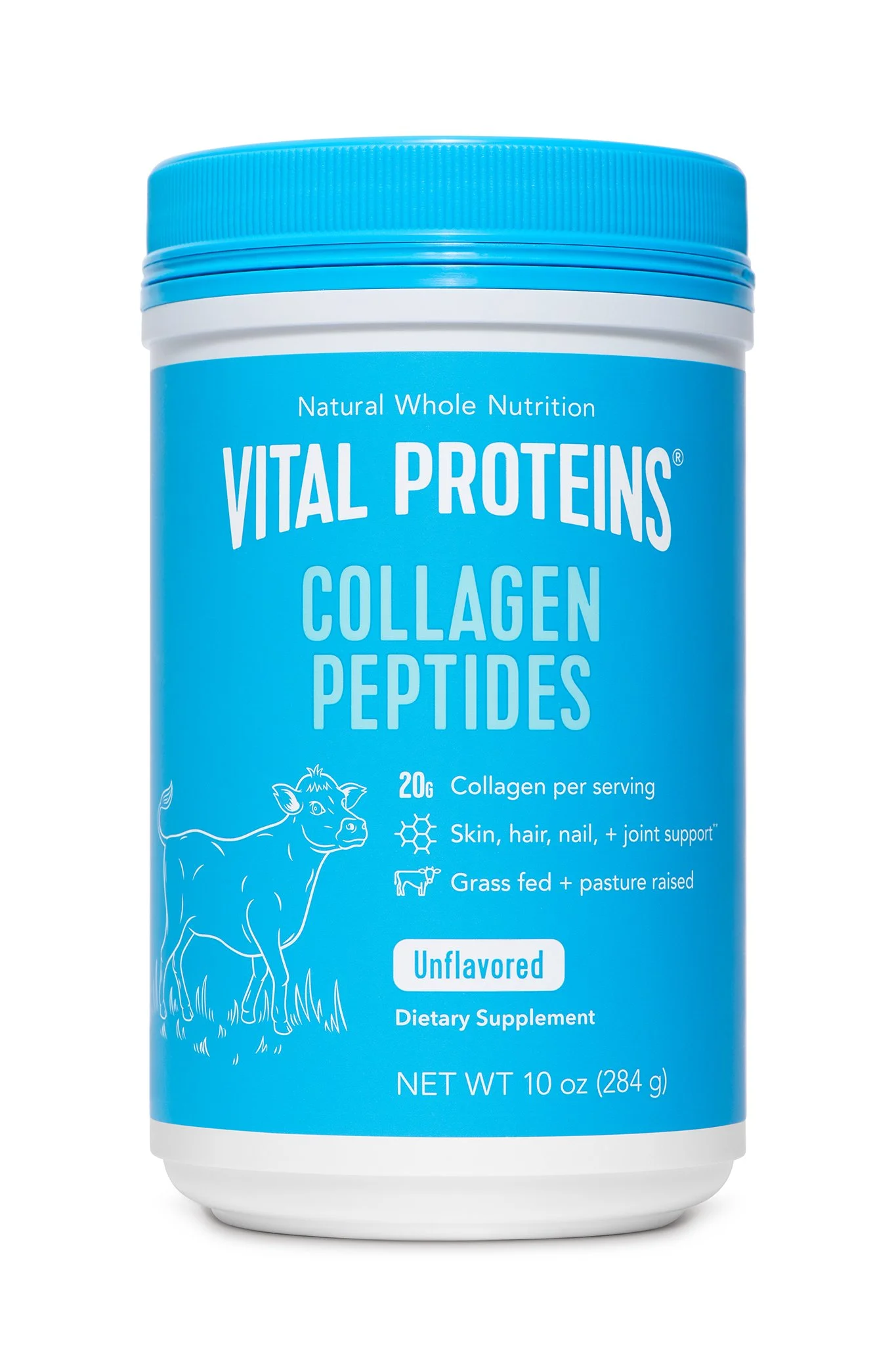The Health Benefits of Collagen & How to Add More to Your Diet
This post contains affiliate links, through which we may earn a small commission if you choose to purchase, at no additional cost to you. We only share products or services we personally use & recommend!
Most of us don’t think of jello as a “health food”… but there’s another side to gelatin that’s worth knowing about!
And it has to do with collagen.
What is collagen?
Gelatin is a flavorless powder derived from the collagen found in animal bones. (Collagen is a protein that’s one of the major building blocks of bones, muscles, tendons, ligaments, and skin.)
It’s high in protein and amino acids, and has numerous health benefits, most notably for skin, hair, digestion and joint health.
For thousands of years, collagen was part of the human diet, through bone broths and animal parts we no longer eat much of (think ox tail, head cheese). Today, most people aren’t getting enough (if any) collagen in our diet.
How to add more collagen to your diet
Fortunately, as a tasteless powder, it’s easy to add collagen into foods we’re already eating. It’s also easily available online and at natural food stores—just be sure to look for collagen sourced from sustainably and humanely raised animals.
There are a couple types of collagen products to note the difference between:
Gelatin dissolves best into a warm liquid. Also, as the liquid cools it will gel.
Collagen hydrolysate (or “collagen peptides”) dissolves into warm or cold liquids and does not cause the liquid to gel, so can be added to any recipe without changing its texture.
Both forms of collagen are essentially the same nutritionally, but collagen hydrolysate (also called “collagen peptides”) is treated with enzymes to break down the bonds between amino acids, resulting in a product that’s easier to digest, and thus even better for people with digestive problems. So, collagen hydrolysate (or peptides) is the option typically used in collagen supplementation.
Collagen’s (many!) health benefits
Here’s a closer look at some of collagen’s many health benefits throughout the body:
Skin health
As a rich source of dietary collagen, both gelatin and collagen hydrolysate help build and strengthen the connective tissues that give skin its firmness and elasticity. This helps reduce wrinkles (caused by collagen depletion through aging), stretch marks, and even cellulite (which is caused by a breakdown of collagen). Similarly, collagen strengthens our nails, teeth and hair.
Digestion
Not only does collagen aid digestion and promote nutrient assimilation, but it also strengthens and heals the gut lining, a key treatment for leaky gut syndrome—the culprit behind many food allergies and intolerances. Collagen also helps regulate metabolism and insulin sensitivity, which aids in weight loss (or maintaining optimum weight).
Bones & joints
Collagen has long been known to support joint health, and is often added to supplements to treat arthritis. (Over time, collagen does contribute to healing, but the immediate relief noticed is actually due to its anti-inflammatory properties.)
The best sources of collagen
Since collagen is a component of animal connective tissue, it is by default non-vegan. Though most collagen products are typically sourced from beef bones, pescatarians can choose marine collagen, which is sourced from fish scales (yum!).
As with any other animal product, just be sure to choose sustainably and ethically produced collagen.
Vital Proteins is one of our favorite brands of collagen—their products are sourced from humanely-raised grass-fed cattle and wild-caught fish.
Vital Proteins can also be ordered as a Subscribe & Save product, which means you save up to 15% and it’s delivered regularly, on a schedule that works for you (skip deliveries or cancel anytime!).
How much collagen should I eat?
The amount of collagen you should aim to supplement in your diet will vary based on your personal health goals and what else you’re eating—for example, if you eat plenty of collagen-containing animal products regularly, you wouldn’t need to supplement with as much. But, most adults can reasonably aim for 10-30 grams daily. (For reference, that’s about one scoop of Vital Proteins.)
Easy & healthy collagen recipes
Here are a few of our favorite, simple ways to add more collagen into your daily diet:
Collagen peptide coffee
One of the easiest ways to add more collagen into your daily diet is to add a scoop to your morning coffee—it’s tasteless and dissolves easily, so doesn’t affect the texture or flavor. We love adding a scoop of collagen peptides to our bulletproof coffee!
Collagen-boosted smoothie
Add a scoop of collagen peptides to a smoothie. Here are our favorite healthy (veggie-packed!) green smoothie recipes.
Thicken stews with gelatin
Add a scoop or two of gelatin to a pot of stew to thicken it.
Gooey oatmeal
This one’s a little different, but we love it! Add a tablespoon of gelatin to a bowl of hot oatmeal and stir. The gelatin will give the oatmeal a subtle gooey texture! We also add ground flaxseed, walnuts and maple syrup.
Gummy snacks
These are basically healthier versions of jello: protein-packed whole food snacks that are easy energy boosts on-the-go. Some of our favorite combinations: strawberry lemon kombucha gummies & creamy mango mint gummies.
Healthy(er) desserts
A collagen-boosted dessert recipe?! Try tapioca pudding or no-bake cookie dough balls.
Need some weekly meal planning help?
Grab our Healthy Meal Planning Workbook—a printable and fillable guide to planning simple healthy meals to make healthy eating a breeze.
It’s part of our Wellness Library of healthy living guides + resources!
FOUR WELLNESS TIP
Try one of the recipes or methods above to add more collagen into your diet!















